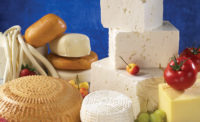
Dairy processors use X-ray equipment and metal detectors to look inside finished foods to find contaminants or to assure consistency to their quality standards. Emmi-Roth Käse USA, a Dairy Foods’ Dairy 100 cheesemaker based in Wisconsin, uses both types of machines.
“We have one X-ray for our Swiss line, and metal detectors on all the other packaging lines,” says Fermo C. Jaeckle, chief executive officer. “Although the X-ray is much more sensitive than the metal detection equipment, we don’t consider it a cost-effective solution for contaminant detection. We use the X-ray to determine interior body consistency and structure.”
New food safety laws, a move to embracing Hazard Analysis Critical Control Point standards and the need to manufacture efficiently (by eliminating re-work, for example) are some of the issues facing dairy processors.
Dairy Foods convened a virtual roundtable of equipment suppliers and asked them about what’s happening in the world of checkweighing practices and X-ray and metal detection. What follows is an edited transcript.

Michael Freeman, Loma Systems, Carol Stream, Ill.: More processors are looking to X-ray as their product inspection system of choice. X-ray can offer many more features than metal detection alone. Not only can it detect a wide variety of contaminants, but it can do things such as weight verification, broken or missing component detection and fill-level verification. Our X-rays can inspect blocks of cheese and conduct “hole analysis” by verifying the size and quantity of holes in blocks of cheese. We are able to confirm this in a non-destructive way.
John Uber, Mettler Toledo, Ithaca, N.Y.: First customers are demanding checkweighers that are constructed to stringent hygienic standards, which are also subjected to tough cleaning routines. Additionally, producers want a checkweigher that can provide greater throughput and finer accuracies sustained over long production cycles. Customers want devices that can execute product changeovers quickly, and can be easily integrated into their overall factory floor automation systems.
Bob Ries, Thermo Fisher Scientific, Minneapolis: As the requirements for food safety become more stringent, dairy processors are looking for equipment that can meet the ever-changing government regulations while protecting consumers from foreign contaminants in their foods and beverages. They are always looking for ways to improve their HACCP policies with better detection devices at critical control points and more consistent, automated methods to audit these devices.
Dairy Foods: What is the top concern among your customers?
Ries: The economy, of course, is the chief concern, but right behind that is how the new food safety law will affect the way our customers operate. Will [it] necessitate a huge investment in new equipment? What will it mean in terms of administrative costs, and how will it ultimately affect the bottom line? They constantly worry about not doing the right thing all the time everyday and ending up with rework, scrap, a large recall or a PR nightmare.
Scott Stone, Mettler Toledo. Aurora, Ill.: Ensuring that the proper product is in its proper container and is properly labeled. Nearly 43% of all recalls are initiated due to product mislabeling. Being proactive in preventing label mix-up by inspecting 100% of all products with a vision inspection solution is an easy and inexpensive way to protect against recalls.
John Klinge, Eriez, Erie, Pa.: Contamination is a major concern. Contamination can enter the production process through raw material as well as equipment wear or failure, such as ground metal, loose bolts or nuts. Employee sabotage can also be the cause of contaminants entering the process.
Freeman: Sensitivity levels are always a concern. If they are a supplier to another food processor, they are often subject to the regulations imposed by their customer. We work very closely with our customers to ensure that our products are meeting the requirements that they are required to comply with.

Ries: [By] developing the types of breakthrough technology that not only helps our customers meet stringent food safety regulations, but provide great value as well. Our AuditCheck performance verification system option tests the metal detector at pre-set intervals throughout the day, but it also provides a “paper trail” proof that the audit was completed. It was designed to be an early warning system informing a customer there may be a problem developing long before it actually happens. Intellitrack XR software helps improve metal detection capability while also reducing false rejects.
Uber: Our Cornerstone SA checkweigher was designed to meet requirements such as the USDA Dairy standards. Further, [it] is built to IP69K ingress protection specifications in order to handle tough cleaning cycles, while having a very open concept to facilitate fast cleaning and inspection cycles. Our control platform has taken the guesswork out of integrating checkweighers to the popular factory floor automation systems, such as Ethernet-IP.
Dairy Foods: What changes in food safety practices or in the dairy industry have impacted your business?
Freeman: We are seeing much more demand for documentation for meeting standards like HACCP, SQF and BRC. We have been refining our communication packages on all of our equipment to meet the demands of our customers. If features are difficult to use, then people won’t use them.
Demand for new inspection technologies has an effect on our business. Whereas we were once only a metal detection company, we have started to see a shift to more and more X-ray inspection. We are seeing how advancements in image processing and interpretation can really add value and features to our equipment.
Uber: Sanitary design requirements are evolving and improving all the time, this means what was accepted practice five years ago is unacceptable today.
Customers want to know more about the health of their process as it contributes to the quality of their product, and the health of their business. This means improved communications capabilities and the ability to verify what is going on in the production line.
Changes in packaging materials, container and serving sizes have impacted many existing production lines requiring either new systems to be installed or modifying existing checkweighers to accommodate the new package and process requirements.
Chris Acierno, Mettler Toledo, Tampa, Fla.: New Global Food Safety Initiatives are being recognized and implemented. Regulatory bodies such as SQF, BRC and IFS are driving new levels of HACCP compliance.
Klinge: Regulations coming from the U.S. Food and Drug Administration and Department of Agriculture and the respective HACCP program are pushing liability into food processors’ laps. These changes have resulted in an increased use of metal detection and X-ray inspection equipment.
Eriez has seen a rise in the use of X-ray inspection systems. Factors that have traditionally plagued metal detectors, such as foil packaging and conductive products, do not affect X-ray machines. X-ray inspection systems have become a very popular choice for yogurt manufacturers that use packaging with foil lids.
Dairy Foods: What new technology or features have you incorporated into your equipment?
Ries: Intellitrack XR enhances dairy product safety by replacing phasing and providing a higher level of protection for manufacturers and consumers alike. IXR learns the actual sinusoidal X and R signals the product creates as it passes through the metal detector. Once the signals are stored in memory, Intellitrack XR cancels them out by subtracting a signal that is equal to but the exact opposite of the product’s X and R signal. Since IXR knows the product signal and removes it-any signal left over is quickly identified as suspect. This all new dual channel (X and R) cancellation algorithm can eliminate the risk of a foreign metal object going undetected in many cases where phasing will mask out the metal signals.
Because products like sliced cheese can change over time, IXR also tracks and adjusts product signals on the fly to assure high-performance and to eliminate false rejects. The result is up to 50% smaller diameter metal can be detected in many previously difficult metal detection applications.
Freeman: The most significant feature is our variable-frequency technology. Our IQ3 line creates a magnetic field that is adjustable by the user [who can] pre-program up to 100 unique product profiles. It also allows a “no compromise” inspection solution. You no longer have to choose a frequency that is “good enough” for your whole production range, and potentially deal with either an over-sensitive (false rejects) or under-sensitive (metal makes it to the customer) metal detector.
Uber: At Pack Expo, we showcased two new products. ProdX software enables users to connect their checkweighers and metal detection and X-ray inspection devices to a common PC or IT network. This allows the user to monitor device health and status both at the line and at a remote location. ProdX enables users to see and record in real-time all packages, which have been rejected as well as any actions, alarms or events, which have occurred on any of the devices.
InTouch Remote Services for checkweighers allows our in-plant technical support team “to see what they see” without having a technician on-site through a totally secure remote connection. The program includes a monthly checkweigher “Health Check,” which provides a status report.
Dairy Foods: Any tips or ideas you can offer a plant manager?
Ries: Start investigating X-ray inspection systems. Cost and reliability are constantly improving. X-rays, many times, can find smaller contaminants than metal detectors and those contaminants can be other materials in addition to metal. In some application, the X-ray system can be used to inspect the product inside the package too by measuring approximate mass, counting objects and determining area to detect packaging errors.
Freeman: Look at the provider’s market focus. Are they focused on food, or are they selling primarily to other areas like scientific instruments/laboratories or homeland security? If their focus is not food, will they be the most knowledgeable?
Uber: Constantly evaluate the status of the information received from the production line. Inspection equipment isn’t just to make sure you didn’t ship a mistake, it’s also a measurement of how the process is performing. The more immediate the measurement, the more quickly you can react to take advantage of the new information.
Acierno: Make inquiries with your manufacturers to see how the equipment can be optimized and utilized to the most foolproof methods. Most metal detector installations can be improved to prevent metal from reaching the consumer.
Sidebar: What Processors Seek in Equipment Suppliers
Price is important when dairy processors shop for X-ray machines, metal detectors and checkweighing devices, but it’s not an overarching concern. Three processors we contacted said they seek technical support, ease-of-operation and reliability.“Technical support has become one of our most important purchasing criteria,” says Fermo C. Jaeckle, ceo of Emmi-Roth Käse USA, “If a supplier cannot help us set-up equipment properly, or is not available to service the equipment within a few hours, we won’t buy from them.” That’s because downtime on just one piece of equipment can shut down the whole line.
“For metal detectors, price is very important, since this is older technology and equipment is comparable from different manufacturers,” Jaeckle says. “X-ray is a bit newer and if we were to buy another one, the software, reliability and other features would be a more important factor than price alone.”
“Price is important as well, but not the first priority,” says an ice cream processor based in the Midwest. His criteria for selecting equipment and vendors include features of the equipment, including reliability, ease of operation and maintenance. “Typically we seek state-of-the-art technology that helps to integrate the operation, and provides information to our operators, technicians and managers.” He adds that technical support and training are also “very important elements to our decision making.”
Says a cheesemaker in the Northeast, “Most important criteria are reliability, serviceability and cost.”



